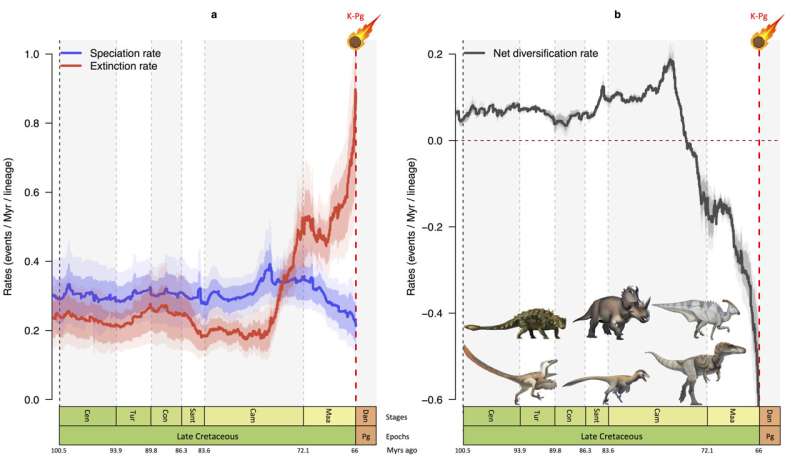A new study shows that dinosaurs were in serious decline before the asteroid which is credited with wiping them out hit. Here we see the drop in new species appearing verses the number of existing species going extinct. They were losing diversity even before the strike.
In my view, creation and evolution have a complex interconnection which is not well explored in today's "debate" over the issue. Naturalism, the belief that nature is all that there is, is the big loser in all this, not creationism or, strictly speaking, evolution.
For example, I've noticed before that nature acts in patterns which are better explained by the direction of a Purpose and an Intelligence rather than natural processes. This goes well beyond the most known example, the Cambrian Explosion. For example, the pattern of diversification shown in the Ordovician defies the expectations of naturalism as well. Indeed, "Burst after near stasis" seems to be a recurring theme of nature, and "Outlier Events" (compared to what would be expected if change was driven by random processes) are the norm. And contrary to the party line, there is only a weak correlation between these radiation events and mass extinctions.
But that is on the side of new forms being produced. What about on the other side of the equation? That too doesn't fit the naturalist view of things. It turns out that not only do categories of organisms diversify in "bursts" with no apparent natural impetus, but they also stop bursting seemingly without natural explanation.
The latest example is the broad and highly successful group "dinosaurs". Non-avian ones to be exact. According to the graphs above, it looks like they essentially "quit evolving" after true birds got here. One can argue that mammals were squeezing them out, that new types of plants arose that they were not so able to digest or what have you, but these bromides merely put off the question. Mammals kept evolving, plants kept evolving, why didn't dinosaurs?
This is a pattern I've noticed before. It is almost as if once "Nature" is done playing with a type of organism, she moves on and that one mostly stops evolving. The change is then focused on the successor group. I first observed this with relation to vertebrae in reptiles and mammals. Despite the vast diversity of reptiles, they seemed unable to develop more than one type of vertebrae in all the eons of time they have existed. Mammals meanwhile have five different types. Why can't reptiles evolve different kind of vertebrae when they changed so many other things? It is as if "nature" was done playing with reptiles and had mostly moved on to something else. This makes no sense with naturalistic premises, but that's what nature looks like.
I'm not the only one who has noticed this. I reported on a study which examined the same pattern which shows up throughout the 543 million years of animal life on earth. An ancestor form will have very little diversity. Then when the modern form appears, it bursts forth in tremendous diversity and swamps the ancestor form which often vanishes. So, the study concluded, a disproportionate amount of all the diversity which ever existed is found in presently living forms.
If you think birds are from dinos, that surely describes what happened there. And birds didn't even take the niches held by the dinosaurs that went extinct. They went extinct even though they were mostly not competing with their own possible "successor form". And if the the study I started with is right, they were on their way out before the asteroid. It wasn't a strike that somehow selectively killed non-avian dinos while sparing birds. It was just the final blow to a group that was already failing to adapt- even though they had adapted quite well for over a hundred million years back when "nature" was letting them change with the times.
Scientists have started asking the question "Is Evolution More Intelligent than we Thought?" The answer to this question is firstly that it is, in a way, a stupid question. "Evolution" can't be intelligent. But God can be intelligent. If what they are trying to say is that nature is behaving in ways that seem to be the product of an intelligence and wondering if therefore there is some kind of intelligence behind nature, then that isn't a stupid question. Rather it is an important question based on profound scientific observations. And the answer to it goes beyond what science can verify (IOW something science, a study of nature alone, must be "stupid" about). Our Creator God is that intelligence behind nature.
My book about early Genesis is far more about Theology than science, and that's good. I've come to see we won't really get the science right, big picture anyway, without getting the theology right.

